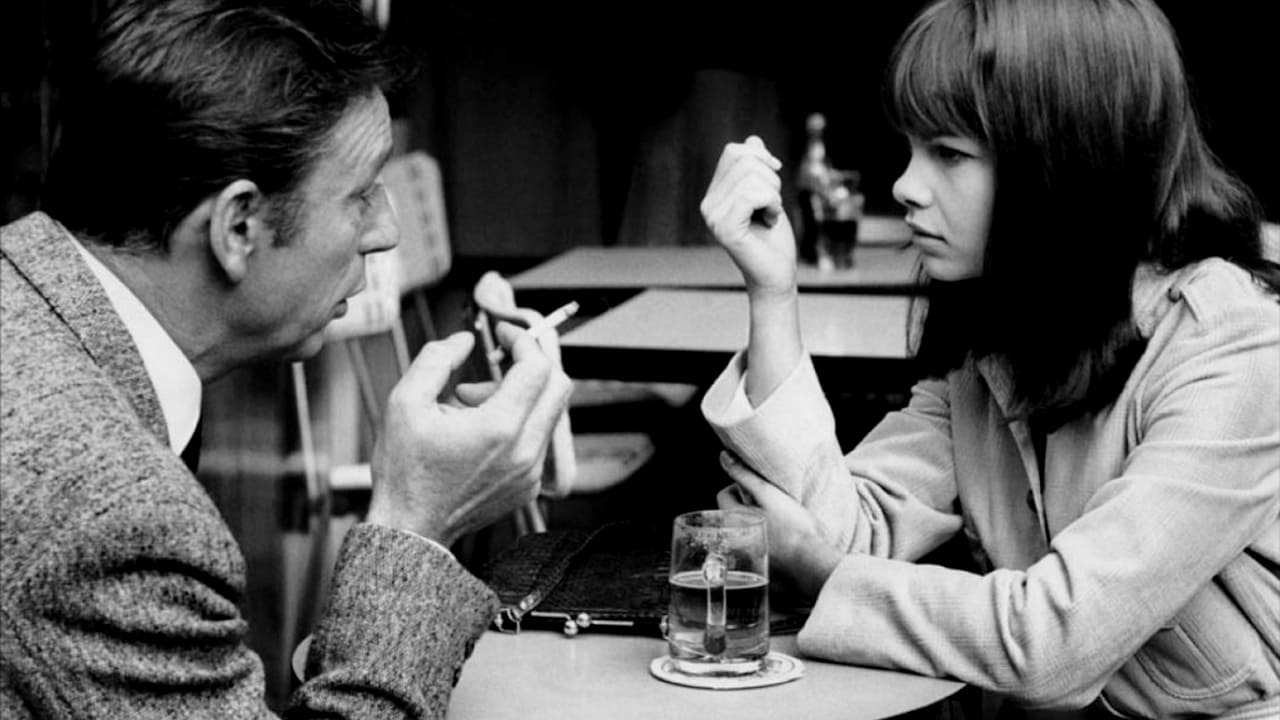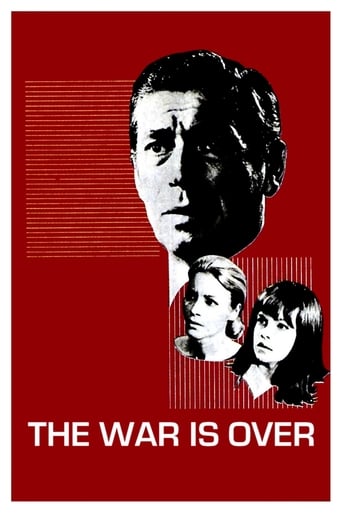

Alain Resnais was part of the so-called Left Bank of the French New Wave, alongside with Varda, Marker and Demy, who were politically much more aware compared to the film fanatics of Cahiers du Cinema (Rohmer, Truffaut, Rivette, Godard, Chabrol). Alain Resnais has always been interested in past but here he focuses on its impact with regards to the future. The War Is Over was his fourth feature, following Hiroshima mon amour, Last Year in Marienbad and Muriel, and still remains as one of the finest films of political cinema. The film builds around the theme of how to come to terms with one's past in order to live in peace with the present. No other place -- maybe Germany or Poland -- offers such a great setting for this but Spain because the shadows of the Civil War are so present. It is a milieu that has become the symbol of the war, so to speak.Diego Mora (Yves Montad) is an old man who spent his youth as a revolutionary in the Spanish Civil War. Now, thirty years later, he's part of a group that wants to redeem the dreams of the revolution in Paris. All the members of the group are living in the past, and so is Diego. But soon he has a moment of realization and breaks himself away from the chains of illusion and decides to make a change. Thus, The War Is Over is really a story about a man who is living a lie. It tells, rather bleakly in a melancholy tone, about old communists who can't let go off the past.The War Is Over might just be Resnais' most satisfying work when it comes to somewhat coherent viewing experience. It's his first film with a clear storyline which is relatively easy to follow even if the editing was deliberately (but not self-deliberate!) ambiguous and confusing. Resnais has succeeded perfectly to relay the flow of time. Moreover, through the character played by Yves Montand the viewer can understand the director's thoughts and emotions, no matter how shattered, because he holds the pieces together. It is he through whom the viewer constructs the big picture.In The War Is Over memories are created for the future. Alain Resnais doesn't try to build the horrors of the past by newsreel footage. He relays the tragedy of the conditions by showing how people are still living in the past, how they are left with unredeemed dreams in their hands. The dream has died in Spain. Of course, Spain is still there but merely as a concrete place full of tourists. People don't understand each other. There is a major breakdown in the communication between the old and the new left. Both are dreaming of a revolution but in their own ways. The legacy of the past torments the protagonist. However, he is not only forced to recall the past endlessly but also to be unable to understand the present reality.
... View MoreYves Montand plays Diego Mora, a Spanish-born refugee living in France but working for the underground resistance trying to overthrow Franco's fascist regime. He's been in this life for years and is becoming disillusioned with the futility of his actions and the inability of his colleagues to change their modus operandi.The story starts at the French-Spanish border, Diego is stopped by the authorities. He was meant to meet a contact in Madrid as part of a plan to organise a general strike in Spain. The police let's him go but he feels something's wrong and his suspicions are confirmed when his friends start being arrested. So he returns to reorganise himself, meet the leaders of the resistance, and spend some time with his love, Marianne (played by Ingrid Thulin).It may sound disappointing to say that not much more happens in the course of the movie, but this movie is not a traditional political thriller. A viewer expecting suspense and tension will certainly find better options. The War Is Over is in fact a character study and an illustration of how futile and unpleasant fighting for one's convictions can be.Through the life of Diego Mora, we discover a world of freedom fighters that cinema seldom portrays: it's boring, it requires patience, it hardly achieves anything, and it's bogged down in rhetoric and theory instead of inspiring action, and no one is thanked for their personal and emotional sacrifices. This is the life of ordinary people who've given up their personal lives to fight for something they believe is worthy but who live forever in the uncertainty: is it all worth it? There are some scenes that stand out for its contrast of ideas: for instance, when Diego meets the leaders of the resistance, he suggests cancelling the general strike. His views are criticised for being too blinded by reality. It seems that Diego, spending too much time in Spain, can't see the big picture anymore, as opposed to the bourgeois-living leaders in Paris with their ideas and quotes from Lenin and other Marxist theorists. If you can't appreciate the black humor of this situation, this movie won't do anything for you.In another scene Diego meets, through a teenager who admires him, several young men who are planning to use explosives to fight Franco. It seems they're more in tune with his line of thinking, preferring action over theory. But Diego can't see eye to eye with them either. Exactly what does Diego want? That's the great existential mystery of the movie.I watched this movie because Jorge Semprún wrote it. Most viewers will come to it via Alain Resnais' name, but this director has never done much for me. So I have little to say about the editing or the cinematography. For me the quality of this movie is focused mostly on the screenplay and the acting.Jorge Semprún was perhaps more interested in politics than Resnais, as we can see by the movies he wrote later: Z, Special Section, The Confession. In these movies I admired his subdued approach to political thrillers. Rather than glamorising, making things exciting, he preferred to dismantle things and analyse them, get to the core of them. That is precisely what he does in The War Is Over, in showing perhaps the most realistic portrait of life in an underground resistance in cinema ever.
... View MoreAlain Resnais was almost a god of cinema in the 60's. That people actually discussed the meaning of Last Year at Marienbad at parties seems unbelievable today (yet check the posts for Mulholland Drive), but it was a cultural object just as real as a Picasso painting. If I say that La Guerre est finie has aged badly, that's not to say that it didn't hold the attention of liberals 40 years ago.The politics of the main (male) characters are fossilized. The old Bolshevik ideals have become more and more detached from reality. Diego knows that there will be no general strike in Spain on May 1st, no matter how hard they will it to happen. Pamphlets smuggled by car into the country in false compartments are not being translated into actions. Diego's lack of authenticity is his real problem: he's spent most of his life in France, speaks better French than Spanish, and is watching people 20 years younger than himself taking more radical steps to end Franco's rule.Marianne has a greater grasp of reality than her lover. After nine years with Diego, she just wants to settle down and have kids, and put an end to the endless coded conversations with her friends (who are ignorant of Diego's revolutionary activities). She watches as Diego gets sloppy--driving with lights out while there's a suitcase full of plastic explosives in the car, as a cop stops them for questioning. Semprun's script makes Montand into a sexual magnet; has any 20-year-old girl taken off her clothes faster for a tired 45-year-old man? The star system dictates that the male lead be a stud, but there are limits.
... View MoreWhile i was watching this movie i was feeling that it would get very interesting.But as the minutes were passing i felt more and more sleepy, nothing interesting was happenning, till the sudden end came....lucky me. Maybe that film is going to be nice for Spanish people...who knows.....
... View More